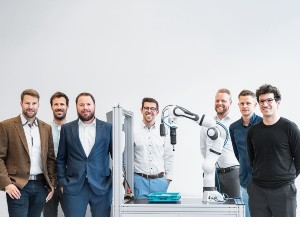 Festo completes FLAIROP international research project with Canadian, German partners
Festo completes FLAIROP international research project with Canadian, German partners
August 4, 2023 REDWIRE is news you can use from leading suppliers. Powered by FRASERS.
Posted by Festo Inc
Innovate today for a new tomorrow For nearly a hundred years Festo has provided proven Industry Leadership, Super... Read more
Subscribe
Free REDWIRE e-newsletter

International research project FLAIROP successfully completed -- picture shows the project team from left to right: Kai Sandmann (Federal Ministry of Economics and Climate Protection), Maximilian Brock (DLR), Daniel Brauchle (Advanced Development Artificial Intelligence, Festo), Florian Leiser (Project Team KIT), Jan Seyler (Head of Advanced Development Analytics and Control, Festo), Sascha Rank (Project Manager KIT), Maximilian Gilles (Project Manager KIT). Note: The Canadian FLAIROP partners presented their results online.
A new international research project involving artificial intelligence (A.I.) and robotics has been completed by The Festo Group and its Canadian partners, startup DarwinAI as well as the University of Waterloo, and the Karlsruher Institut für Technologie (KIT) in Germany. Concluded at the Festo facility in Esslingen-Berkheim, Germany, the project results were presented live in Canada.
The FLAIROP (Federated Learning for Robot Picking) project was sponsored by the German Federal Ministry for Economic Affairs and Climate Action.
More robust, efficient A.I.
For two years, these partners have researched how to make picking robots more intelligent with distributed A.I. methods. They investigated how robots can learn from each other without sharing their training information, an approach called Federated Learning. This technique enables development of more robust, efficient A.I. than would be possible with data from only one robot, without handing out sensitive corporate data.
By developing a universal, simulation-based data set, the research partners can train autonomous robots so that they can dependably grasp objects that they have not encountered previously. The Federated Learning System will be developed further in the future, so the platform can allow different organizations to train robot systems together without sharing confidential information, and this can boost the acceptance of these systems in practice.
With Federated Learning, instead of sending the training information of the robotic arms in the picking cells to a central server to train the model there, training occurs at various locations. Locally trained models are sent to the central machine-learning server, to ensure private training data never leaves the data provider. But Federated Learning allows learning across data silos by aggregating the distributed models and enabling highly accurate and info-driver prediction of object recognition and grasping point detection. The robot arms in the picking cells have cameras that detect items in front of them visually, and they select suitable gripping methods based on the camera images.
Now that the project is complete, the research results will be published, and any interested parties can freely use the information in initial pilot projects. The live presentation demonstrated which Festo robotic solutions can incorporate Federated Learning.
For more information, contact Festo.
Share
Posted by Festo Inc
Innovate today for a new tomorrow For nearly a hundred years Festo has provided proven Industry Leadership, Super... Read more
